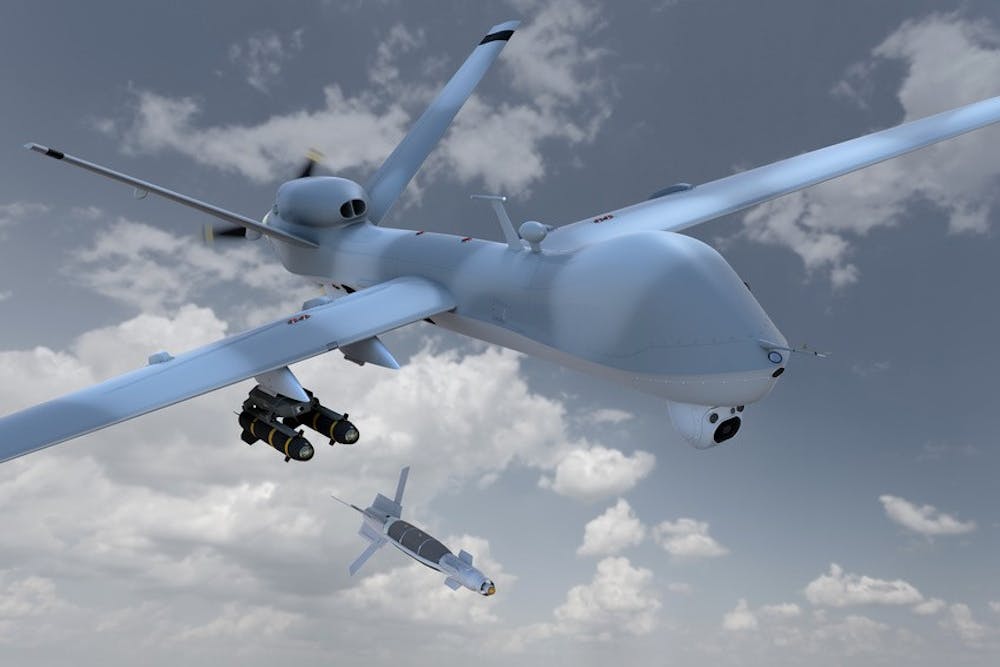This Monday’s Hesburgh Lecture: “Deadly Drones,” delivered by Notre Dame law professor Mary Ellen O’Connell in Buckley Center Auditorium, highlighted the recent moral and legal controversies surrounding the U.S. government’s use of drone strikes in the Middle East.
O’Connell, who has testified before Congress several times concerning drones, said her main objection with their legality is that although the U.S. has used drones for military operations in Afghanistan and Iraq, it has authorized drone strikes to target suspected terrorists in Pakistan, Yemen and Somalia, countries not within armed conflict zones.
“Killing on a battlefield can be lawful, and if you are targeting an individual leader of your opponent who is a combatant, you are justified to target such persons,” O’Connell said. “What we’re talking about tonight is targeting persons outside those armed conflict zones.”
O’Connell’s lecture was timely in regard to recent events in the international debate on drones. Last week, Amnesty International and Human Rights Watch both released a report that judged certain incidences of U.S. drone strikes in the last 18 months to be potential war crimes. On Tuesday, Congress, for the first time ever, heard accounts of an alleged U.S. drone strike from Pakistani civilians who survived this strike.
In response to these criticisms, the U.S. government has denied that its drone strikes violate international law and asserted its commitment to reducing civilian casualties.
Drones, which are aircrafts without a human pilot on board yet are remotely controlled by a pilot on the ground, have been used by the U.S. military, and more controversially, the CIA, to remotely conduct surveillance of other countries. However, they have recently become known for their ability to target and kill terrorists and other enemies in the U.S.’s war on terror.
O’Connell used religious examples, like the Ten Commandments, and philosophical examples, like Aristotle, to emphasize her belief that using drones disregards human rights.
“Human beings at all time have a right to life,” she said. “This is a fundamental, if not the most fundamental, legal and moral principle that we have.”
In particular, O’Connell stressed the example of the 2011 assassination of Osama bin Laden, who was not killed by a drone strike but by a group of U.S. special forces, as a reason drones are not necessary for successful military operations.
“To me, that shows what we could do in a situation of grave danger, sending in skilled forces,” O’Connell said. “It’s not that we have to be weak, but that’s the way to do it, where children are not hurt and less mistakes are made.”
Junior Grace Powell, who attended the lecture, thought this example was effective in explaining how not using drones can protect innocent bystanders from being killed in a conflict zone.
“She said his (bin Laden’s) wife was in the room and she lived, and I think that’s proof that there are other ways besides drones to find these individuals and find justice,” Powell said.
Despite her serious subject matter, O’Connell offered a brief moment of levity in the early part of her lecture when her remote control to the overhead slideshow seemed to malfunction.
“The CIA is obviously interfering with my slideshow,” she quipped, to laughs from the audience. But the light mood quickly sobered when O’Connell added, “And they wouldn’t want us to see this picture.”
The slideshow then displayed a picture of a young Middle Eastern girl with the caption “Will I Be Next?” This signified one of the moral complications of using drones to target enemies. According to O’Connell, since 2001, 4,037 people have been killed by U.S. drone strikes, an estimated 205 of them being children.
“(With drones), you have to have a sense that you’re only killing in a way that meets your military objective,” O’Connell said. “We have a military goal in these drone strikes, but to kill over 4,000 people over a stated goal of two dozen people on the president’s kill list certainly does question the idea of proportionality.”
Senior Cecilia Cervantes, who attended the lecture, was surprised by the number of people who have died from drone strikes.
“I mean, the number of casualties of people killed by drones was shocking,” she said. “I have done reading on Pakistan but I had no idea about Somalia, so that was really interesting to see the numbers on that.”
UP political science professor Anne Santiago, who teaches international relations, said recent revelations about the U.S.’s use of drones, like the Amnesty International report, may result in international pressure for the U.S. to stop drone strikes, but that pressure might not be strong enough.
“When it comes down to power, the U.S. is clearly the most powerful actor in the international system as a state-entity,” Santiago said. “Now there could be a lot of pressures from a lot of different places on the U.S. that could constrain their actions, but oftentimes the more power you have, the more you get away with things.”
O’Connell challenged her audience to hold their government accountable for its controversial decision to use drones.
“We should have the courage to demand the United States’ respect for human life,” she said. “That the lives of men, women and children are not sacrificed for some increase in power or psychological security.”








